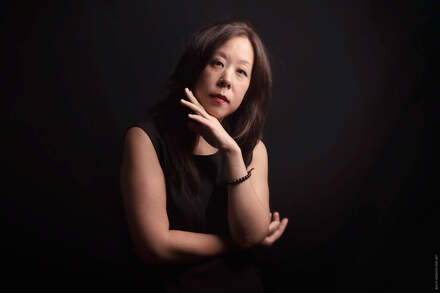About
Shin Yu Pai is the 2024 Shelley Memorial Award winner
Shin Yu Pai is currently Civic Poet of The City of Seattle. She is the author of 13 books, most recently No Neutral (Empty Bowl, 2023) and Less Desolate (Blue Cactus, 2023). From 2015 to 2017, she served as the fourth Poet Laureate of The City of Redmond. Her work has received awards from The Academy of American Poets, Artist Trust, 4Culture, and The Awesome Foundation. Shin Yu’s visual work has been exhibited at The Wing Luke Museum, The McKinney Avenue Contemporary, The Paterson Museum, The American Jazz Museum, The Three Arts Club of Chicago, Center for Book and Paper Arts at Columbia College Chicago, and the International Print Center. She is a three-time fellow of MacDowell and has been a writer in residence for the National Park Service, Taipei Artist Village, Centrum Foundation, and Ragdale Foundation. Her video poems have screened at The Zebra Poetry Festival in Berlin and Northwest Film Forum. She is the creator and host of Ten Thousand Things, an award-winning, chart-topping podcast on Asian American stories that she writes and produces for KUOW, Seattle's NPR affiliate. She received her MFA from the School of the Art Institute of Chicago and studied also at the Jack Kerouac School of Disembodied Poetics at Naropa University.
Selected by Gabrielle Calvocoressi and Yona Harvey.
Judges' Citation
Rather than citing a writer as the greatest influence on her “poetic sensibility,” Shin Yu Pai credits her mother, Noko Pai, as the “creative virtuoso [who]…created a language that I wanted to know and enter into.” Before her mother immigrated to the United States in her early twenties, Shin Yu recounts in her visionary and groundbreaking book, Ensō, that her mother studied visual arts and worked as a graphic designer in Taipei. Noko Pai’s devotion to diverse art practices—many self-taught—and to retaining her cultural heritage outweighed her interest in studying the English language. One can observe similar resistance choices throughout Shin Yu Pai’s multidisciplinary career, most notably, perhaps, her disinterest in conventional life-writing narratives. For years, Pai’s poetry has wrestled with complicated issues of food and agriculture, ecology, climate change, environmentalism, motherhood, and performance. She is multidisciplinary in the truest sense. Pai challenges herself with the release of each book. Her readers can chart not only her artistic development but what feels like genuine pleasure in the making of these poems. Though she studied photography at the Art Institute of Chicago, Pai has for the most part intentionally separated her photography practice from her poetry practice. However, she has long given us innovative visual poems such as those in Sightings: Selected Works 2000-2005. One discerns from reading Pai’s poetry the deep, intricate thinking that inhabiting the particular spaces of visual artist, essayist, and bookmaker brings. All the while, she honors her teachers—from Naropa University to the citizens of the City of Redmond, where she served as Poet Laureate—not merely in epigraph, but in the way she scrutinizes and reimagines poetry and the poet herself. One could commit to reading Pai’s earliest works (Equivalence, Unnecessary Roughness, Adamantine) to her most recent publications and never want for complexity, humor, playfulness, and evidence of a life beyond “craft.” As Pai has noted: “Once, I believed that I had no ambition. Or, rather, I misunderstood it entirely. I thought that the privilege of the gift is to simply practice, whether or not that work circulates in the world. But there is much wrapped up in the sharing of one's creative and cultural practices, as they can express the best parts of being human, the wisdom we have the opportunity to glean for ourselves and transmit to another.”
saving time
with thanks to Jenny Odell
they weren’t given time to flower
once more; in the week after
daylight savings, the light grown
longer; the temperature warmer;
our city chainsawed them down,
declaring them diseased though
arborists that campaigned to save
the sakuras saw no evidence of decay,
and once the cherry trees
were stumps, affirmed healthy
heartwood and cambium; these
trees had no voice so activists
cited the Japanese American story,
the farmers that once moved produce
at Pike Place before their removal;
though some resisted - nature,
like people, has also
been known to stand its ground
like that rogue palm tree planted
at Alki Beach or the Giant Sequoia
that’s persisted just east of Macy’s
they have no value, are deemed
worthless despite being wayfinders
for all who see trees as time
markers of when we are
versus trees as canopy and shade;
and the local news is quickly
subsumed by the doom scroll
of more important stories –
the diesel derail in Anacortes:
3,100 gallons of hazardous fuel
spilled on Swinomish territory;
government and business forget
to think about who was here before,
in their forward-thinking versions
and visions of development
losing touch with witness,
trees chopped down before they could
bloom again, complete their cycle – like
salmon returning to spawn – sakura
petals like snow blanketing Pike Street again
"saving time" reprinted from No Neutral (Empty Bowl, 2023) with permission of the author. Author photo by Arzente Fine Art.


